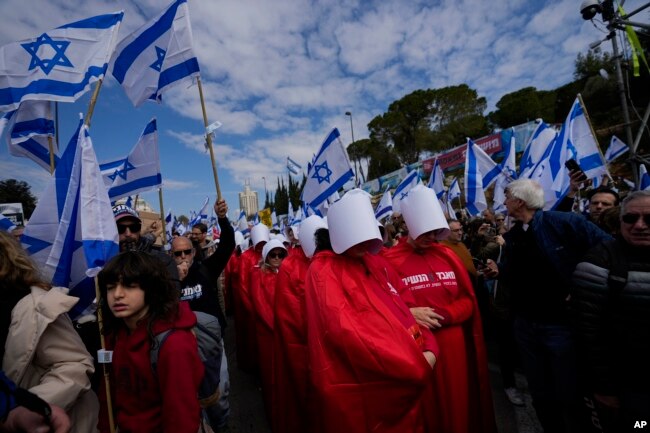Tens of thousands of Israelis protested outside parliament Monday to show their opposition to government plans to reshape the country’s judiciary.
Some demonstrators carried flags and blew horns. Others shouted “democracy” and “no to dictatorship.”
The large protest took place outside the Knesset, Israel’s parliament building in Jerusalem. Other large demonstrations were held in other cities.
The administration of Prime Minister Benjamin Netanyahu has proposed changes to the country’s Supreme Court. Protests over the plans have been going on for weeks. The demonstrations have been supported by some influential business leaders and former military officials.

The government plans would give the prime minister greater control over judicial appointments. Experts say the process would weaken the Supreme Court’s ability to rule against government leaders.
The Knesset’s Constitutional Committee voted Monday to move the first official version of the plan forward. Several lawmakers were thrown out of the building after trying to delay the legislative process, Reuters news agency reported.
“They hear our cry. They hear the strong voice of truth,” opposition leader Yair Lapid said to the crowd outside of parliament. “They hear it and they’re afraid.”
Netanyahu and his supporters say the proposed changes are needed to limit a judiciary that has become too powerful. But his critics say the changes would ruin Israeli democracy. Critics have also suggested that Netanyahu has a conflict of interest. He currently is on trial for a series of corruption charges.

Organizers claimed at least 100,000 people protested at the Knesset. Members of opposition parties gave speeches to the crowd which included Arabs, women and LGBTQ activists.
Thousands of people arrived in Jerusalem by train. Hundreds of others gathered for a protest at Jerusalem’s Western Wall – Judaism’s holiest place – before marching toward the Knesset.
Although Netanyahu and his allies have a majority alliance, it is not clear when the full parliament will begin debating the legislation.
Netanyahu issued a video accusing his political opponents of starting unrest and purposefully pushing the country “into anarchy.”

But Netanyahu noted there is still a way to reach a compromise. “Most citizens of Israel don’t want anarchy. They want a substantive dialogue and in the end they want unity.”
At a joint press conference at the Knesset, former defense minister Benny Gantz said opposition party leaders remained united “against the targeted assassination of democracy.”
Netanyahu and his allies took office in December after the country’s fifth election in four years. That election centered on Netanyahu’s fitness for office at a time when he was facing serious criminal charges.
Netanyahu has criticized the country’s police, prosecutors and judges and said he is the victim of efforts to push him out of office. His critics say the proposed legal changes will destroy Israel’s democratic system of checks and balances.
I’m Bryan Lynn.
The Associated Press and Reuters reported on this story. Bryan Lynn adapted the reports for VOA Learning English.
_______________________________________________________
Words in This Story
horn –n. a noise-making device
anarchy –n. a state in which people are not controlled by laws or rules
substantive – adj. important or serious
dialogue – n. a formal discussion between countries or groups of people
assassination – n. the killing of someone important or famous
prosecutor – n. a lawyer who prosecutes people
checks and balances – n. rules meant to prevent one person or group from having too much power within an organization
